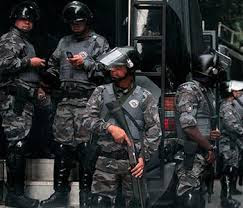Tuesday, August 20, 2013
Misplaced Sympathy? Police Forces- São Paulo
Okay, before getting distracted by a brain-damaged seal yesterday, I was originally going to post about this story "Metade das escolas forma policial em até seis meses" ("Half of schools graduate police officers in under six months"). Basically the story, as written by the highly reliable and objective Folha de São Paulo (sorry, does my sarcasm show?) is that there is an undue hurry to get police officers out on the street. Instead of a comprehensive community-oriented classwork, there seems to be a churning out of grey-uniformed officers ready only for the most obvious situations, and given only outlines of conflict resolution and mediation.
Now if you've seen Cops, that fine American tv program, you would think that conflict resolution was about 80% of a US police officer's job. You know, so-and-so doesn't want to move out of the trailer but his wife has thrown everything out the window including his television and maybe his dog. So, the negotiations begin. I get the feeling here in Brazil that there is not much negotiation: just haul off whoever to the station. If, as a friend points out, the police show up at all.
As many of you know, I have a natural sympathy towards the police. I grew up in towns where police officers were effective, were community members who contributed to the community well-being, and folks who you could always approach if you needed help. We knew many by name. I would also point out that the reverse is not true: not many knew MY name because I was a good girl. Really.
When I moved to São Paulo, big city or not, my natural instinct was to trust the police, unless given a reason otherwise. And so far, I do not have a reason to do otherwise. After 8 years living here (between two postings), I still can't shake my trust and respect of the police. I have had nothing but neutral to good interactions. Okay, some of them, like the toner incident, are just plain ridiculous. The instinct to trust is not, though, the natural inclination of most Brazilians. And lest we all forget, this country is less than 30 years away from a military dictatorship where many REALLY BAD things happened at the hands of the police. I get it. Well, no, I don't. I don't think you can understand that kind of fear and uncertainty until you have lived it.
This Folha column seems to provide more reason for sympathy for the currently undertrained men and women of the police forces--folks who have nothing to do with Brazil's military past. Studies have proven that six months is just too short a time to get good officers who are focused on the important issues of daily police work. Imagine: in six months time, they are handing these trainees guns, pointing them in the direction of a car, and putting them on the front lines against experienced criminals. Instead of conflict resolution classes, and how to handle protests, they are learning about the law. Which is good, but one should not replace the other.
The police force in Brazil is one of the most underpaid in the world. A starting-out military policeman in São Paulo makes R$26,000 (US$10,000) per year. A starting police officer in New York City makes US$41,000 per year. In London, US$33,000. And the Brits don't even have to carry guns! Yes, cost of living differences, etc. I know.
It seems clear that the police force in Brazil is undertrained and underprepared. What this means for the World Cup and the Olympics; well, that's anyone's guess. But my expectation is not a pretty one. I still lean towards sympathy to this underpaid group. One of the moments that my sympathy felt strongest was when a military policeman here explained to me that crimes that result in penalties under four years (theft, for one) mean that the perpetrator is out on the street the very next day. There is simply no room left in the prisons for petty thieves. Imagine that you have chased someone for hours on a Thursday, and he waves hi to you from a bar on Friday. And we wonder why police men are frustrated.
By the way, I also read in a second article in the paper that there are actually eight different police forces in Brazil. Ready for the list? Federal, Guarda Municipal, Civil, Rodoviária, Portuária, Legislativa, Militar and Cientifica.
Now in English:
1. Federal (crimes against the government, white collar crime, drug trafficking investigations, also the guys that check every last item I bring into the country. As wikipedia says: "The Federal Police is the Brazilian equivalent of the American FBI, DEA, ATF, TSA, USBP, INS and Secret Service all rolled into one." They are busy.)
2. Municipal Guard (security forces of the cities/towns, protect municipal treasures such as buildings, parks and sculptures),
3. Civil (the state investigation and detectives group)
4. Highway (seems obvious),
5. Legislative (no clue),
6. Military (the chase and apprehend guys)
7. Scientific (no clue--CSI São Paulo? Forensics? Seem to be part of the Civil Police. Maybe.)
And I'm not even going to touch on the really scary dudes like the Tropa de Choque (shock forces). Think SWAT. Think getting out of the way fast. That's a whole lot of weaponry.
Labels:
crime,
military police,
police,
police academy,
police training,
policia,
protests,
security
Subscribe to:
Post Comments (Atom)


No comments:
Post a Comment